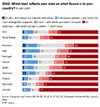Arrest warrant issued for Putin by the ICC
Toothless piece of distraction and propaganda, basically.
Peskov's statement
Expect more of this kind of nonsense as they run out of ideas, while the situation for Ukraine deteriorates rapidly.
Arrest warrants have been issued by judges at the International Criminal Court for Russian President Vladimir Putin and his Commissioner for Children's Rights.
In a statement, the ICC says they are suspected of the war crime of unlawfully deporting children, from Ukraine to Russia.
It says the crimes were committed in Ukraine from 24 February 2022 - when Russia launched its full-scale invasion.
Russia's commissioner for children's rights, Maria Lvova-Belova, is also wanted by the ICC for same crimes.
Judges had mulled issuing secret warrants but decided that making them public could "contribute to the prevention of the further commission of crimes".
Toothless piece of distraction and propaganda, basically.
Peskov's statement
The Russian Federation does not recognize the jurisdiction of the International Criminal Court and considers its decisions null and void, said Dmitry Peskov, commenting on the issuance by this body of a warrant for the arrest of Russian leader Vladimir Putin.
"We consider the very posing of the question outrageous and unacceptable; Russia, like a number of states, does not recognize the jurisdiction of this court and, accordingly, any decisions of this kind are null and void for the Russian Federation from the point of view of law," the Kremlin spokesman said.
Expect more of this kind of nonsense as they run out of ideas, while the situation for Ukraine deteriorates rapidly.






